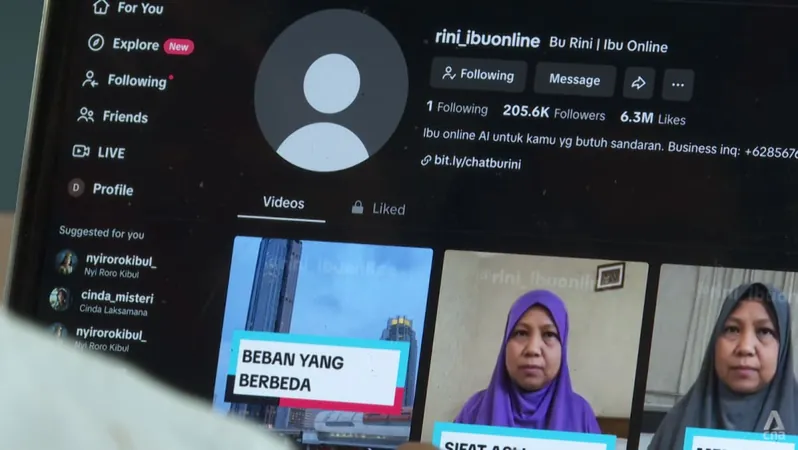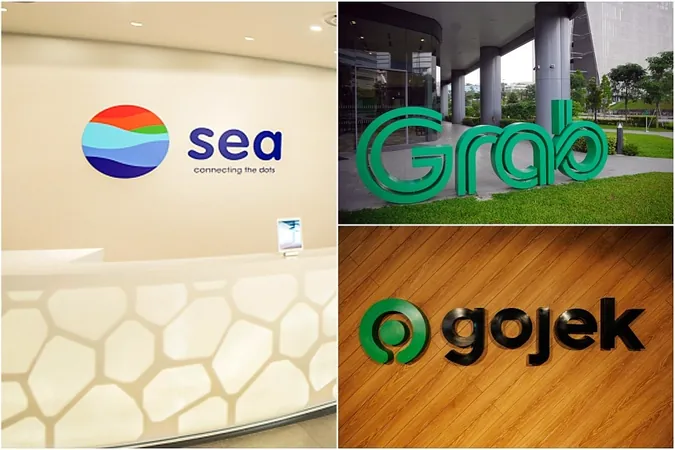
Indonesia Prepares for AI Regulations as Virtual Influencers Rise
2024-10-02
Author: Wei Ling
Introduction
Meet "Ibu (Mother) Rini," an advice-giving virtual influencer who knows how to capture hearts on social media platforms like Instagram and TikTok. With over 230,000 followers and millions of likes on her straightforward videos about love and health, she has become a sensation in the digital landscape. What makes her stand out? She’s not just a conventional influencer—she’s powered by artificial intelligence, bringing a new twist to content creation.
AI-Powered Influence
Created by Avatara Labs, "Ibu Rini" is an example of what AI can do in engaging audiences, holding live streams that can draw in more than 2,500 viewers within an hour. The company is clear about her AI identity, ensuring that audiences know they are interacting with a program, not a person. "We are not trying to fool our audience. That's one of the ethical things that we need to do... if you are interacting with him or her, that is actually AI," said Ananto Wibisono, co-founder and CEO of Avatara Labs. This approach aligns with a directive from Indonesia's Ministry of Communication and Informatics, which emphasizes transparency and accountability in AI practices.
Indonesia's Regulatory Landscape
As AI technology evolves in Indonesia, the government recognizes the need to establish regulations to guide its development and usage. With projections from global management consulting firm Kearney estimating AI could contribute a staggering $366 billion to Indonesia’s GDP by 2030—accounting for up to 12% of the economy—there is a significant incentive to harness its potential responsibly.
National AI Strategy
Indonesia has been proactive, launching a national strategy for AI development back in 2020. Currently, the Ministry is reviewing proposed regulations aimed at ensuring ethical use, data security, and the involvement of humans in all stages of AI design. “It’s crucial that humans remain in control as AI technology advances,” said Hokky Situngkir, the ministry's director-general of applications and informatics.
Data Security Concerns
In an age where data breaches are rampant, many industry players are advocating for stringent regulations. With AI tools being leveraged for sensitive operations like forecasting sales and analyzing consumer behavior—such as the AI assistant "Olin," designed for the food and beverage sector—data security is paramount. “We structure our data like a safe deposit in a bank, ensuring that merchant information is stored securely,” explains Gunawan Woen, co-founder of a company specializing in software solutions for F&B businesses.
Challenges in Adaptation
However, not all organizations have adapted at the same pace. Alpha JWC Ventures, a venture capital firm, is still navigating the rapid changes in AI development, as co-founder Jefrey Joe highlights their ongoing conversations about data privacy and security, which have become top priorities for the firm.
Conclusion
As Indonesia gears up to regulate the burgeoning AI industry, it faces the challenging task of balancing innovation with ethical oversight. The future of AI in the archipelago may be brighter with these proposed regulations—keeping users safe while encouraging technological advancement. Stay tuned, because AI is just getting started in transforming Indonesia’s economic landscape!


 Brasil (PT)
Brasil (PT)
 Canada (EN)
Canada (EN)
 Chile (ES)
Chile (ES)
 España (ES)
España (ES)
 France (FR)
France (FR)
 Hong Kong (EN)
Hong Kong (EN)
 Italia (IT)
Italia (IT)
 日本 (JA)
日本 (JA)
 Magyarország (HU)
Magyarország (HU)
 Norge (NO)
Norge (NO)
 Polska (PL)
Polska (PL)
 Schweiz (DE)
Schweiz (DE)
 Singapore (EN)
Singapore (EN)
 Sverige (SV)
Sverige (SV)
 Suomi (FI)
Suomi (FI)
 Türkiye (TR)
Türkiye (TR)